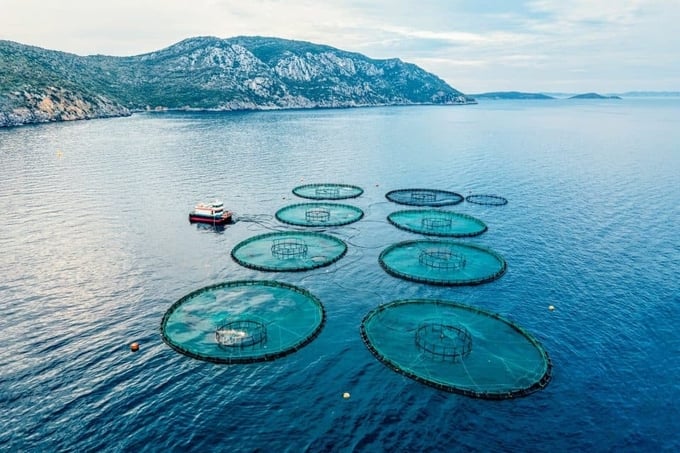December 8, 2025 | 02:28 GMT +7
December 8, 2025 | 02:28 GMT +7
Hotline: 0913.378.918
December 8, 2025 | 02:28 GMT +7
Hotline: 0913.378.918

Unlike traditional wild fisheries that depend on capturing fish from natural bodies of water, aquaculture involves cultivating these species in tanks, ponds, or ocean enclosures.
A recent report by the United Nations Food and Agriculture Organization (FAO) highlights this shift and underscores the growing importance of sustainable aquaculture in meeting the world’s food needs.
Aquaculture, often referred to as fish farming, is the practice of breeding, rearing, and harvesting aquatic organisms like fish and seaweed in controlled environments.
Unlike traditional wild fisheries that depend on capturing fish from natural bodies of water, aquaculture involves cultivating these species in tanks, ponds, or ocean enclosures.
This method allows for greater control over growing conditions, such as water quality, feed, and breeding cycles, which can lead to more efficient and sustainable production.
Aquaculture plays a crucial role in supplementing wild fish stocks, reducing pressure on overfished populations, and contributing to global food security. It also supports livelihoods in coastal and rural areas by providing jobs and economic opportunities.
By producing high-quality protein with lower environmental impact compared to some land-based farming practices, aquaculture presents a promising solution to meet the increasing global demand for nutritious and sustainable seafood.
In 2022, aquaculture reached a significant milestone by producing 94.4 million tons of aquatic animals. This impressive output accounted for 51 percent of the total aquatic production globally.
Even more noteworthy is that 57 percent of this production was specifically intended for human consumption. This achievement underscores the growing importance of aquaculture in meeting the world’s food needs.
The increase in aquaculture production is crucial as the global demand for aquatic foods continues to rise. As populations grow and dietary preferences shift towards healthier and more diverse options, the need for reliable sources of aquatic foods becomes more pressing.
The FAO highlights the importance of sustainable production practices in aquaculture. Ensuring that aquaculture operations are environmentally friendly and resource-efficient is vital for maintaining the health of our ecosystems.
“Aquatic systems are increasingly recognized as vital for food and nutrition security,” the report states. This sentiment was echoed by experts who recently gathered in Costa Rica to discuss ocean conservation.
Due to their diversity and capacity to provide ecosystem services, aquatic food systems offer a promising solution to enhance global food security and nutrition.
Despite the steady production levels of wild fisheries over the past decades, aquaculture has seen a 6.6 percent increase since 2020. However, the sustainability of wild fishery resources remains a significant concern.
The proportion of marine stocks fished within biologically sustainable levels dropped to 62.3 percent in 2021, down from 64.6 percent in 2019. The report calls for urgent action to accelerate the conservation and rebuilding of fishery stocks.
With the global population projected to reach 8.5 billion by 2030, significant investments are necessary to ensure adequate food, nutrition, and livelihoods. The report highlights the potential of aquaculture, particularly in Africa, where it remains largely untapped.
Currently, over 40 percent of the global population cannot afford a healthy diet, making the role of aquaculture even more critical. Aquatic products are among the most traded food commodities, generating a record $195 billion in 2022 – a 19 percent increase from pre-pandemic levels.
Despite these achievements, the sector faces significant challenges, including climate change, water scarcity, pollution, and biodiversity loss.
The report’s release coincides with a meeting in San Jose, Costa Rica, where country representatives, scientists, and international experts are preparing for the third UN Ocean Conference in France in 2025.
United Nations Under-Secretary-General for Social Affairs, Li Junhua, emphasized the urgency of protecting the ocean, stating that it is “not an option but an imperative.”
Costa Rica’s President Rodrigo Chaves, hosting the two-day meeting, warned that failing to act would jeopardize the future of humanity. Participants are debating critical issues, including the ocean’s capacity to absorb carbon dioxide, the need for sustainable fishing practices, and tackling marine pollution.
In conclusion, the shift from wild fisheries to aquaculture marks a pivotal moment in global food security. Sustainable aquaculture offers a viable solution to meet the growing demand for aquatic foods, but it requires significant investment and concerted global efforts to overcome the challenges posed by climate change and other environmental threats.
(Earth.com)

(VAN) Newly designated initiatives in Australia, Canada and South Africa represent science-based and inclusive examples of ecosystem restoration.

(VAN) Rice-based food has been selected as Japan's 'Dish of the Year' for 2025, reflecting public interest in the stable supply of the country's staple food amid a recent rice shortage.

(VAN) A research project in Sweden explored how valuable substances can be extracted from organic waste, such as food waste and animal manure, and how this loop can be closed by producing animal feed.

(VAN) Average retail fertilizer prices continued to be mostly higher during the fourth week of November 2025, according to sellers surveyed by DTN.

(VAN) Inaugural Appeal focuses on cost-effective agricultural solutions that link urgent needs with long-term resilience.

(VAN) Landmark SOLAW 2025 report reminds us that resources for food are not infinite.

(VAN) Climate change is a growing concern for agricultural productivity and several studies have focused on how climate variations can impact crop yields.